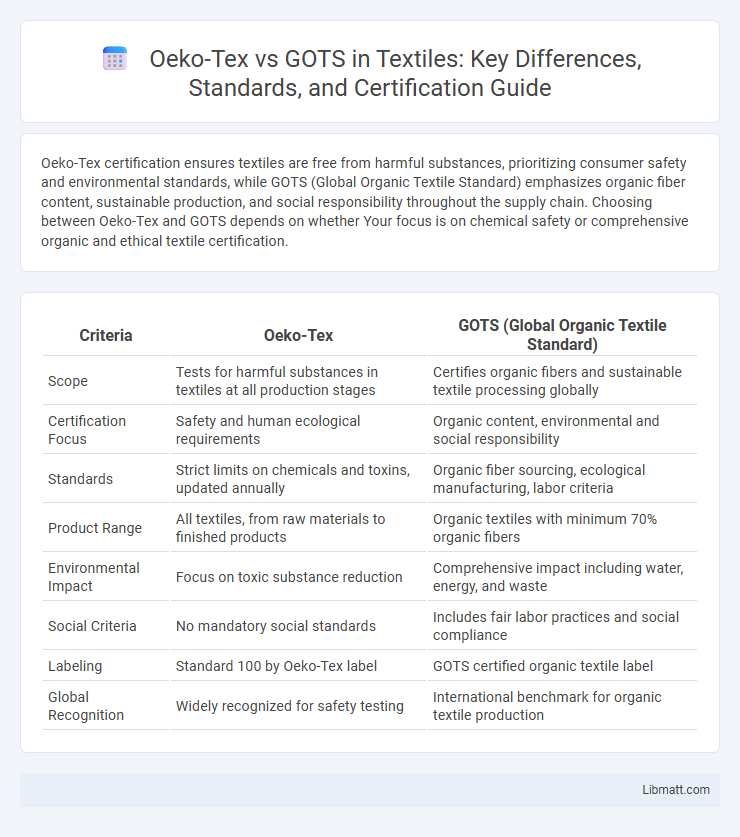Oeko-Tex certification ensures textiles are free from harmful substances, prioritizing consumer safety and environmental standards, while GOTS (Global Organic Textile Standard) emphasizes organic fiber content, sustainable production, and social responsibility throughout the supply chain. Choosing between Oeko-Tex and GOTS depends on whether Your focus is on chemical safety or comprehensive organic and ethical textile certification.
Table of Comparison
| Criteria | Oeko-Tex | GOTS (Global Organic Textile Standard) |
|---|---|---|
| Scope | Tests for harmful substances in textiles at all production stages | Certifies organic fibers and sustainable textile processing globally |
| Certification Focus | Safety and human ecological requirements | Organic content, environmental and social responsibility |
| Standards | Strict limits on chemicals and toxins, updated annually | Organic fiber sourcing, ecological manufacturing, labor criteria |
| Product Range | All textiles, from raw materials to finished products | Organic textiles with minimum 70% organic fibers |
| Environmental Impact | Focus on toxic substance reduction | Comprehensive impact including water, energy, and waste |
| Social Criteria | No mandatory social standards | Includes fair labor practices and social compliance |
| Labeling | Standard 100 by Oeko-Tex label | GOTS certified organic textile label |
| Global Recognition | Widely recognized for safety testing | International benchmark for organic textile production |
Introduction to Oeko-Tex and GOTS
Oeko-Tex is a globally recognized certification system focused on testing textiles for harmful substances, ensuring consumer safety and eco-friendly production. GOTS (Global Organic Textile Standard) sets comprehensive criteria for organic fibers, emphasizing environmental sustainability and social responsibility throughout the entire supply chain. Both certifications play crucial roles in promoting sustainable textile manufacturing, with Oeko-Tex prioritizing chemical safety and GOTS emphasizing organic integrity and ethical practices.
Overview of Oeko-Tex Certification
Oeko-Tex certification ensures textiles are tested for harmful substances, guaranteeing product safety and consumer health. The Standard 100 by Oeko-Tex evaluates every production stage, from raw materials to finished products, based on stringent chemical criteria. This certification is widely recognized for promoting transparency and sustainable practices within the global textile industry.
Overview of GOTS Certification
The Global Organic Textile Standard (GOTS) certification ensures textiles meet strict environmental and social criteria from harvesting raw materials to manufacturing and labeling. GOTS verifies organic fiber content, prohibits harmful chemicals, and enforces fair labor practices, making it a comprehensive standard for organic textiles. This certification is globally recognized and emphasizes sustainability, transparency, and ethical production throughout the textile supply chain.
Key Differences Between Oeko-Tex and GOTS
Oeko-Tex certification primarily focuses on testing textiles for harmful substances to ensure consumer safety, while GOTS (Global Organic Textile Standard) certifies organic textile production with strict environmental and social criteria throughout the entire supply chain. Oeko-Tex emphasizes chemical safety in finished products, whereas GOTS covers organic fiber content, sustainable farming practices, and fair labor conditions. The standards differ in scope, with Oeko-Tex offering product-level certification and GOTS providing a comprehensive system for organic textile processing and manufacturing.
Environmental Standards Comparison
Oeko-Tex and GOTS both set rigorous environmental standards, but GOTS offers a more comprehensive approach by certifying organic fiber content and overseeing the entire textile supply chain from harvesting to labeling. Oeko-Tex primarily focuses on testing harmful substances in textiles, ensuring your products are free from chemicals that pose health risks. Choosing between them depends on whether you prioritize holistic environmental impact with GOTS or chemical safety with Oeko-Tex.
Social and Ethical Criteria
Oeko-Tex and GOTS both ensure high social and ethical standards, but GOTS has more comprehensive requirements, including fair labor practices, safe working conditions, and workers' rights certification. Oeko-Tex primarily focuses on individual product safety and toxic-free textiles but lacks extensive social criteria compared to GOTS. Your choice matters if ethical sourcing and social responsibility throughout the supply chain are priorities for sustainable textile production.
Chemical Restrictions and Safety
Oeko-Tex and GOTS both enforce stringent chemical restrictions to ensure consumer safety; Oeko-Tex Standard 100 focuses on limiting harmful substances in finished textiles, testing for over 100 regulated chemicals including formaldehyde, heavy metals, and pesticides. GOTS (Global Organic Textile Standard) applies comprehensive chemical restrictions throughout the entire supply chain, prohibiting toxic chemicals like azo dyes, phthalates, and chlorine bleach, promoting the use of environmentally friendly substances. Both certifications prioritize human health and environmental safety, but GOTS holds stricter ecological criteria by integrating organic fiber requirements alongside chemical safety standards.
Scope of Certification: Products and Processes
Oeko-Tex certification primarily focuses on ensuring the safety and absence of harmful substances in textiles and leather products, covering finished goods like clothing, bedding, and accessories. GOTS (Global Organic Textile Standard) certification goes beyond product testing to include strict environmental and social criteria throughout the entire supply chain, from organic fiber harvesting to manufacturing process compliance. Your choice between Oeko-Tex and GOTS depends on whether you prioritize chemical safety alone or a comprehensive approach addressing both organic material sourcing and ethical production practices.
Which Certification Is Better for Consumers?
Oeko-Tex certification ensures textiles are free from harmful substances, providing consumers with confidence in product safety and skin compatibility. GOTS (Global Organic Textile Standard) goes further by certifying organic fiber content and environmentally responsible production practices, appealing to eco-conscious buyers prioritizing sustainability. Consumers seeking comprehensive assurance on health and environmental impact often prefer GOTS for its stringent criteria, while those focused on chemical safety may choose Oeko-Tex.
Conclusion: Choosing Between Oeko-Tex and GOTS
Choosing between Oeko-Tex and GOTS depends on specific sustainability goals and product requirements; Oeko-Tex focuses on chemical safety and testing throughout textile production, while GOTS certifies organic fiber content and enforces strict environmental and social criteria. For consumers prioritizing chemical-free textiles and broad safety standards, Oeko-Tex offers reliable assurance, whereas GOTS is ideal for those committed to organic materials and comprehensive eco-social compliance. Evaluating certifications based on fabric sourcing, manufacturing processes, and ethical standards is essential for selecting the most suitable option.
Oeko-Tex vs GOTS Infographic

 libmatt.com
libmatt.com